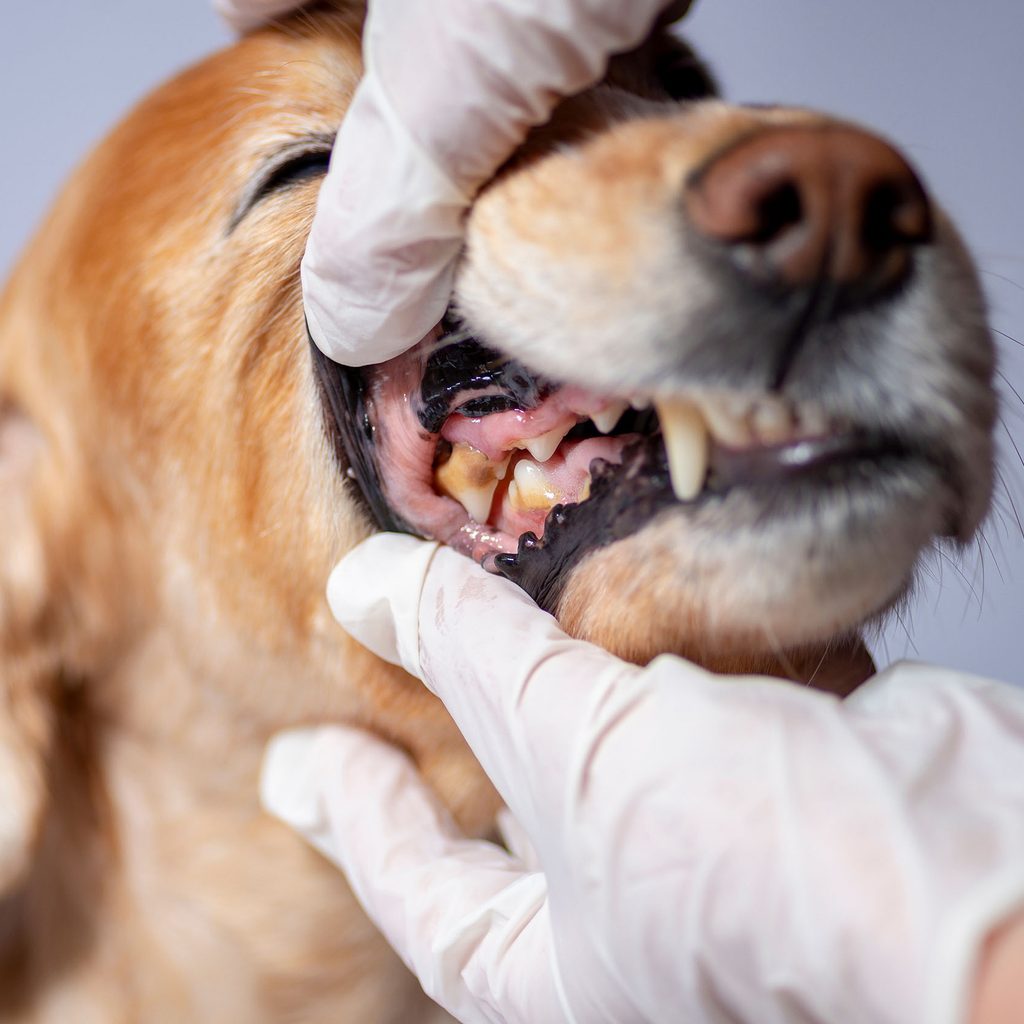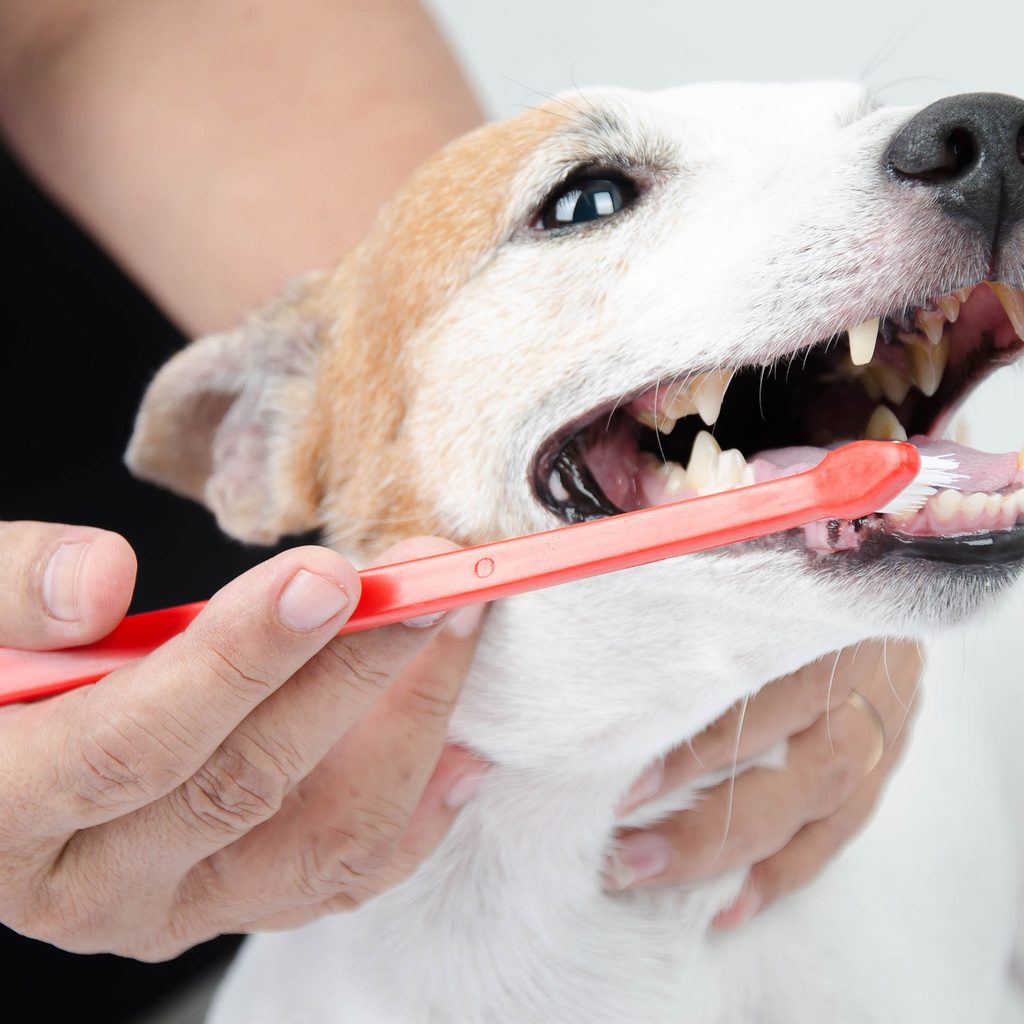Just like us, puppies are born without teeth. Their baby teeth grow in, and when the pup is around 12 weeks old these fall out to make way for the adult teeth that they’ll have for the rest of their lives. But if you have an older dog losing teeth, there is likely a more serious issue at hand. It is not a normal part of the aging process for an adult dog to lose their teeth. If your pooch is missing a tooth or if they have some loose choppers, it’s time to seek help from a veterinarian. Here are a few of the most common causes of tooth loss in dogs and what you can do to protect their pearly whites.

Is it normal for older dogs to lose teeth?
Ordinarily, adult dogs should not lose their teeth as they age. If they do, it is typically a sign of some type of shock or disease. Injury or trauma, like if your dog hits their head or mouth, can cause teeth to loosen and eventually fall out. Hard treats like antlers and marrow bones can also damage teeth. When dogs chew something too hard, their teeth could crack and fall out. Poor diet and metabolic disorders can also lead to dental damage. If your dog experienced distemper, malnutrition, or some other ordeal when they were a puppy, they could suffer from abnormal development of their teeth and tooth enamel as they age. The result leaves their teeth weakened and more susceptible to plaque growth and tooth decay.
But perhaps the most common cause of adult dog tooth loss is poor dental hygiene. When left untreated, tartar growth can evolve into periodontal disease. This condition can cause tooth infections, abscesses, and bone loss, all of which can cause teeth to loosen and fall out. Thankfully, many of these causes can be prevented with the assistance of your veterinarian. Keep reading to learn what to do to protect your furry friend’s teeth.

Make an appointment with the vet to prevent dog tooth loss
Whether you suspect injury or disease, your first stop should be the veterinarian’s office. If your pup recently had an accident that caused tooth loss, your vet can check their mouth to ensure no underlying issues may have contributed to it. They will also confirm that the entire tooth fell out. If part of it is still in the gums, it can lead to pain and infection down the line.
As for periodontal disease, the condition is unfortunately widespread in adult dogs. It is irreversible, and additional issues will arise the longer you wait to treat it. Schedule an appointment with the vet as soon as you notice any one of these periodontal disease symptoms:
- Bad breath
- Drooling
- Gum inflammation
- Difficulty chewing
- Appetite loss
- Receding gum line
- Loose or missing teeth
If your dog has already been diagnosed with periodontal disease, your veterinarian can perform a professional dental scale and polish every few years. This can help protect the gums and teeth from further damage and prevent tooth loss.

Prioritize your dog’s dental hygiene
It’s never too early to start thinking about your dog’s oral health. With these tips, you can protect your dog’s teeth and prevent periodontal disease. If your dog has already been diagnosed, these measures won’t reverse the disease, but they can help to prevent further degeneration.
Brush their teeth
Brush your pup’s teeth with a toothbrush and toothpaste made for pets. You don’t need to brush twice a day as you do for yourself; two to three times per week should suffice. Brushes are available with long handles (like regular, human toothbrushes) or in the form of rubber tips that fit on your fingers. There are also sprays, gels, and powders that can help remove plaque if your dog will not sit still for brushing.
Give them chew toys or dental chews
Dental treats and chew toys can help stimulate the gums and remove plaque from your dog’s teeth. Look for dental chews with high-quality ingredients, and never leave your dog unattended with a treat, as it could break into small pieces that pose choking hazards. For toys, you can choose from textured toys, rubber bones, rope toys, and more to take care of your pup’s oral health.
Use a water additive
Water additives are essentially like mouthwash for dogs — they help control the spread of tartar and plaque. Simply pour the recommended amount into their water bowl. The additive may change the flavor of the water slightly, so if you notice your dog is drinking less water than before or is avoiding the bowl completely, try a different brand to see if he prefers another flavor. The most important thing is to ensure that your dog is still drinking water and if you can’t find a product they like, stick to dental chews and tooth brushing.
Final thoughts on dog tooth loss
For an old dog, tooth loss is a severe problem. It is usually the result of injury or a medical condition. Periodontal disease is one of the most common reasons that adult dogs experience tooth pain and decay. But there is always hope! The first stop for these guys should be the vet’s office. They can determine the cause of your dog’s oral health issues and recommend ways to prevent future tooth loss. To protect your fur baby’s dental health, regularly brush their teeth, give them chew treats and toys, and provide a water additive. By taking these steps, you can stop plaque in its tracks and avoid any oral discomfort for your dog.





